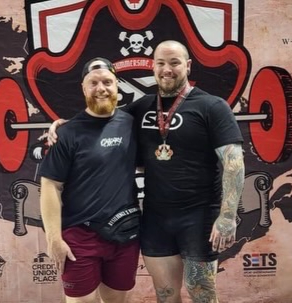What I (re)Learned at CPU Nats 2024
- Taylor Shadgett
- Sep 18, 2024
- 8 min read
The whirlwind of a week is over. I am still recovering. Physically and mentally. I hit a PR for number of days, and sessions, attended/coached at CPU Nationals 2024. In many ways that may make it the highlight of my coaching and powerlifting career. It was a great to be a part of so many sessions, meeting new people, seeing familiar faces, hugging old friends, and watching so much great lifting. Thank you to each, and every one of the lifters who put their trust in me to help them through their Nats journey. Thank you to all the volunteers who make big meets like Nationals run so well. Which leads me to the first thing I relearned at Nats 2024.
If you lift, you should volunteer.
I didn’t volunteer though. No, but I have, I usually do, and probably could have. I usually spot and load big boiz after I lift. Coaching 8 sessions, while simultaneously trying to keep up with regular online coaching commitments, followed by lifting on day 5 made it more difficult to volunteer. But I still think everyone should volunteer. I probably could have made it work on day 2 or 3. The meets do not run without volunteers. If you are worried you will screw up, or don’t know enough to volunteer, the best way to learn about how a meet runs, or how to spot and load, is to volunteer at the score table or on the platform. The other volunteers and refs are there to help keep the lifter safe as well.
I feel like this is the first national championship I have attended in a while where they were struggling to find volunteers. Especially early in the week. Perhaps that is always the case earlier on in the week, but this was the first time I had been there since day 1 and was able to witness everything. At the same time, I was inspired meeting people that travelled from as far as Alberta, just to volunteer on the platform. Other individuals who travelled from the Yukon many days before they competed, so that they could volunteer. Meets run faster with more volunteers. Faster meets mean the volunteers don’t have to work as long. Many hands make light work. If you lift at Nats, find a way to volunteer.
Show up in shape
Be able to warmup fast, but space things out and relax during your warmup. Start your bodyweight and mobility warmups too early. Make sure that you are ready to be on the bar 30 minutes ahead of when your flight is supposed to start. Keeping total warmup sets to 5 after taking the bar makes spacing out your warmups very manageable. Space your warmups out between the middle and the bottom of the attempt order for the flight before you. You probably don’t need to be doing that many reps after your first two or three warmup sets.
It is important to show up in shape for the times when you are not able to space things out as much. Sometimes flights will be short, or you will be in a one flight session, worse yet people can scratch and bomb, making the flights even shorter. Competitions will run faster than you think, especially when there is a good 5 or 6-person spotter/loader team on the platform. The bathroom is usually further away than you think it will be. Show up in shape. On paper a meet is only 9-1 rep attempts, but it is so much more than that when spaced over 3 or 4 hours.
Open Light
Open Light, and if you miss on a technicality, DO NOT GO UP. Everyone knows this, yet every year people still make this mistake at the local level up to the national level. Open Light. Open lighter than you think. Even if you know you are already opening light. Don’t ever be afraid of opening too light. Opening 5-10kgs lighter probably won’t ruin your success on the day. I ended up lowering both my squat and deadlift opener on the day. I bet I would have benched a bit more and chipped my last meet if I had opened at 145 instead of 150. I had numbers set in my head earlier in the day and couldn’t back off on Bench. I should have lowered it because I didn’t really have too much confidence with how things were feeling during warmups. This carried into my opener and second but if I had opened a bit lighter, I might have had more confidence after my opener and would have tried a lighter second attempt, which also would have given me more confidence heading into my third, which ended up being fairly easy as far as 3rd attempt benchpresses go. I saw more than one of the classic examples of a lifter moving their opener well, but missing on a technicality, over confidently going up anyways, missing again on the technicality or just flat out missing, subsequently bombing. I’ve been there. Usually, this kind of thing happens on your best lift, not your worst. We have all been there, if not yet then eventually. Open lighter than you might think you need. No egos with an opener, it’s not about where you start, it’s about where you finish.
Learn your card/flag colours
You should learn your card colours. It will be helpful when you get one blue or yellow card, and you must explain to your client what they did wrong and or better yet understand for yourself what needs to be fixed. The new scoreboards are very helpful for this, when they put up the main errors accounted for by the card colour. Regular exposure to this would be helpful training for lifters and coaches, along with teaching spotters and loaders at the same time. It also keeps things clear and takes guesswork away from the coaches. I found it made approaching the jury more reasonable. Though it seemed they were quick to turn coaches away for most of the week, which is not a complaint. I applaud this, we have great refereeing at the national level. I would rather the jury leave most of the day in the hands of the refs making the calls. Any time there was a call that I truly thought was questionable or should be overturned, they did so, and I can only think of two lifts where this happened (not my lifters).
Make Lifts, especially early in the meet
You may be capable of going up 10 in the squat or benchpress. But the risk is not worth it, especially if you miss. An all-out grind miss is more fatiguing and destructive than we think or admit. It is very tough to ride the line pushing as aggressively aggressive as possible with attempt selection but not overdoing it. Knowing that you for sure had 2.5-kgs on a lift but you aggressively jumped 7.5-10 because of your ego or just making the wrong call is more painful later when you are -5 on what you should be late in the mee, and the deadlift specialist rolls out of the back to tie your total and win on bodyweight. Lifters that make it onto the podium usually go 9/9.
Chase hydration all day
Chase hydration all day, even if you didn’t water or gut cut. Warmup rooms are warm, get it? You will sweat more than you think. The meet will run longer than a normal long training session. Your normal hydration will not cut it. Keep chasing hydration because you will forget to take your normal sips of your preferred intra workout beverage. Side note, Walter told me he prefers MJ’s Secret Stuff, I need to get on that stuff too. Other side note, Derrick CBB had horrible cramping issues for years, whether he cut or not. His secret sauce is good ol fashioned Coca-Cola. Can’t beat a good anecdote when it starts working every time. My go-to hydration formula is half and half Gatorade/water with a packet of Pedialyte or hydration salts thrown in there. I kept chasing hydration all day, hoping I would be in better shape to coach the next morning, as well as continuing to chase hydration while I coached and travelled, hoping my post meet recovery would go well. Force yourself to be peeing between every attempt by the time you get to deadlifts.
At the end of the day, you need to be able to hit a huge pull
Watching Kwaku, Walter, Bryce, and Erik execute all day and position themselves so that they would have the last touch at the end of the day was so impressive. All 4 of them stepped up to the plate in the bottom of the ninth, down 3 with the bases loaded, and hit a walk off grand slam out of the park. At the end of the day, the huge deadlift is a huger advantage. The fact that Walter can load up and smoke a 360 second attempt is crazy. Earlier in the day, the big squatters had to be more conservative and play chess attempting to make sure they made all their lifts, did not miss by shooting too high, and left some in the tank for benchpress and deadlift.
In an actual competitive setting, being a deadlift specialist is a huge advantage. At the highest levels, usually the strongest lifters are just everything specialists, but they can always load it up and deliver a huge pull at the end of the day. If the cards are played right, they usually can underpull what they are capable of on the day, like Kwaku and Bryce. The other advantage is that the opponent subtotal lifters can either run the risk of being too cautious, knowing that they cannot miss, or too aggressive, missing and leaving kgs on the platform. We saw this on the weekend when Stanley was aggressive for his 3rd benchpress but missed. 3-5kgs would have been huge at the end of the day if it forced Walter to load even a bit more.
I am not sure what this even means from a coaching or programming perspective. Should you bias training to your weak points? Or to your strengths? If you have a huge pull, do you bias more to improving your squat and BP? Or do you lean into the pull? What about if you are a subtotal lifter? Do you just try to make the gap so large during squat and bench that people can’t keep up? Or do you bias training to bring up your lagging deadlift. I am not even sure I have an answer. Everything could be right. I just enjoy thinking about it. At the end of the day the lifters I mentioned put together huge sub totals before they nailed the huge pull to lock things down.
Everyone that qualifies should do Nats
Nats is the most fun meet of the year. You qualified, you deserve to be there. There are qualifying standards for a reason, get those impostor syndrome thoughts out of your head. Seeing friends, family, and foes, year after year is always a great time. My favourite memories from this meet are mostly seeing old friends, some who have become mothers and fathers, or seeing lifters who used to be sub-junior or junior blossoming into outstanding open competitors now acting as veterans of the sport, lastly just shooting the shit with my buddies in the warmup room in between coaching attempts.
Powerlifting is great, but family is greater
I already mentioned that it was great to see all my friends and feel the love of the powerlifting community. But none of that will compare to coming home to be with the one who makes home not a location but a living breathing essence. I already knew this week away would be hard for both of us. I am grateful to be able to check-in to the home base every day and know that I am supported and loved while I am away. Even after our dogs chase a skunk while on a walk, get sprayed, roll in the spray more, and you must bathe them both, all before heading to work in the morning, cursing my name the whole time for teaching Bear to chase squirrels. I know not everyone would receive the love and encouragement I received when I first mentioned I might want to go coach for a full week at CPU Nats and try to compete near the end. I know that I am loved and supported every single day. I wanted to come home as soon as I got to PEI. I love my life, my family, and the routine our team has built together. I had a blast at Nats, but am so happy to be home.


See Y’all in Moose Jaw. I look forward to the next one and am more hyped to be a great coach, lifter, and partner moving forward.










Comments